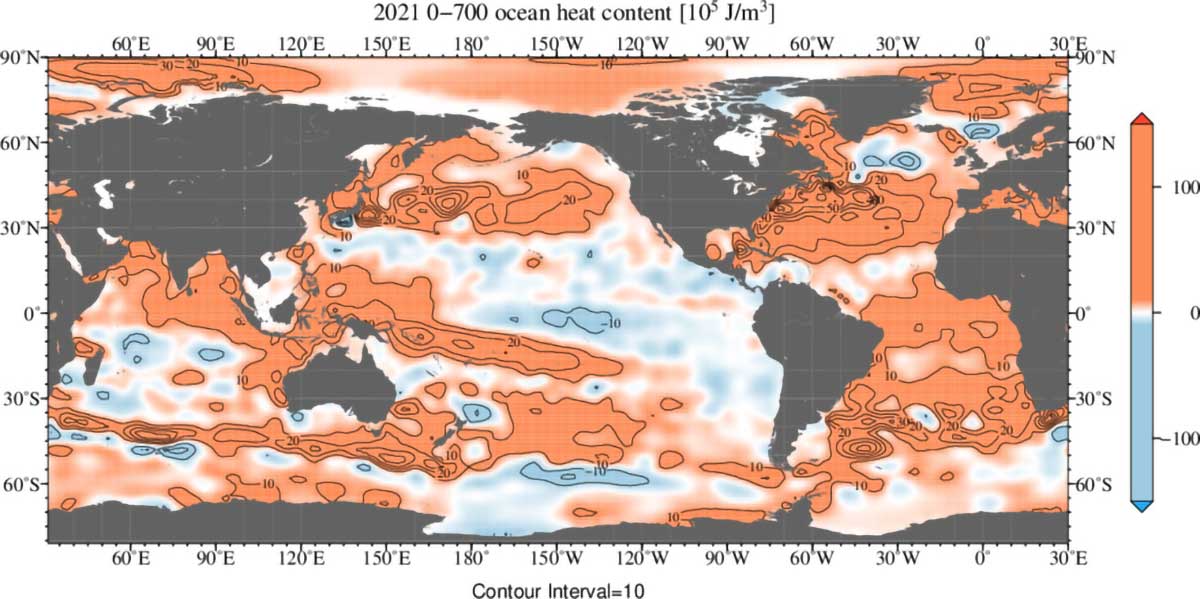The IPCC report and two subsequent follow-up reports detailed the now "unequivocal" scientific consensus that the human-generated concentration of greenhouse gases is trapping more and more heat within Earth's climate system. Recently several studies making the headlines have focused on the record-breaking levels of heat within oceans, with the subsequent effects on marine ecosystems and dependent human systems.
Oceans cover more than 70% of Earth’s surface and are slower to both absorb and release heat, creating a “thermal inertia" that mitigates the global average temperature increase across land and sea. More than 90% of Earth's excess heat is being absorbed by oceans. To understand and track this rising energy imbalance, studies regularly measure ocean heat content (OHC). In the latest study, scientists from around the world analyzed thousands of 2021 global ocean temperature readings, each taken from depths of at least 6,500 feet (2,000 meters). Among the study results, they found not only that oceans last year were the warmest ever recorded but that the heating also continues to accelerate.
They found that ocean temperatures in 2021 were elevated by about 14 zettajoules (1021 joules of energy), which translates to the planet’s oceans absorbing the heat equivalent of seven Hiroshima atomic bombs detonating each second of the day for 365 days. This annual OHC value increased significantly over the record 2020 values from the Institute of Atmospheric Physics/Chinese Academy of Sciences (IAP/CAS) and from the NOAA National Centers for Environmental Information (NCEI/NOAA).

To understand how rising OHC levels are manifesting in the world's oceans, the study assessed basinwide changes and regional hot spots. The fastest warming is occurring in the Atlantic, Indian, and northern Pacific Oceans—a trend that is expected to continue in the future with rising greenhouse gas emissions. The annual intensity, frequency, duration, and size of "warming anomalies" continues to increase. These marine heat waves can be partly fueled by El Niño events and by advection associated with high-pressure blocking, such as from the heat dome over the Pacific Northwest in the summer of 2021.
Another recent paper from scientists at NOAA’s National Centers for Environmental Information Center (NCEI) studied heating in the Arctic Ocean, not covered in the above OHC study. They found that from 1982 to 2020, marine heat events reached or surpassed historic thresholds and are at equivalent or stronger levels than all other ocean basins covered in the previous study.
In a related study, researchers at the Monterey Bay Aquarium assessed the rise in global "extreme ocean heating events"—spiking marine heat waves that can drive ecosystems beyond tolerable levels. These "extreme" sea surface temperature (SST) events were defined by analyzing and mapping global historic measurements from the pre-industrial period from 1870 to 1919 and finding the highest 2%, creating a “local extreme heat index," which could be compared against recent SST measurements. Their findings showed that from 2014 through 2019, more than half of the world’s oceans (57%) have consistently been surpassing historic extreme heat thresholds. While this study stopped at 2019, given rising ocean heat content, there will likely be an even higher percentage in 2022.
Far-Reaching Consequences
Ocean heat can have a cascade of other effects on marine ecosystems. To help tackle some of these issues, the One Ocean Summit was held in early February, gathering world leaders to look at the effects of climate change and sea level rise, as well as issues such as overfishing and plastic pollution. We should expect more this month on the topic of ecosystems as we near the release of the third follow-up to the IPCC report on February 28. It will focus on damage from global warming to land and sea ecosystems, as well on the human systems dependent on them. The report will also emphasize potential practical adaptations and integrated mitigation strategies for communities at risk, along with strategies for reducing emissions to meet climate goals.
Ocean warming also fuels extreme weather events such as stronger tropical cyclones and heavier precipitation; contributes to sea-level rise as warm water expands and glaciers melt; and harms biodiversity—all of which the IPCC study authors recommended be incorporated into climate risk assessments, adaptation, and mitigation. Implications for coastal communities are particularly important, warranting changes to building codes and modifications to development plans. These communities may also experience greater risk to livelihoods from widespread disruptions to the marine food web. The world finds itself at a tipping point when scientific investments in addressing climate change can still make a material difference. At the same time, as the focus of the upcoming report suggests, there is an increasing need for effective investment in strategies to mitigate the growing impacts. The (re)insurance industry, empowered by the latest modeling and analytics, is in a unique position to assess the globally interconnected risk posed by a warming climate and help governments and organizations build a more climate-resilient future.




